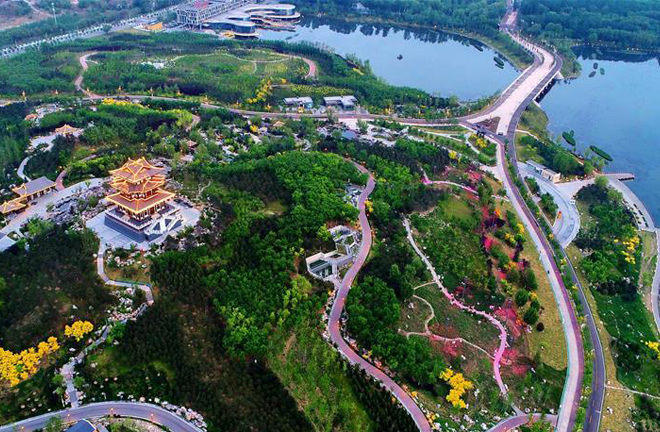Interdisciplinary studies needed to promote ecological society

The picture shows the South Lake scenic area located in Tangshan, Hebei Province. South Lake, once a deserted coal mine area where a large amount of Tangshan’s waste was deposited, has become an ecological park through years of unremitting efforts. (PHOTO: XINHUA)
At a humanities and social sciences forum on the environment held in Nanjing from Oct. 21 to 22, nearly 50 scholars from domestic universities and research institutions discussed the progress and deficiencies in China’s research on environmental issues in the past decade from the perspectives of various disciplines, such as history, anthropology, psychology and philosophy.
No single discipline can provide scientific and effective frameworks for interpreting and tackling problems of the environment, so it is necessary to establish a broadly defined environmental science that includes natural sciences, engineering technology, humanities and social sciences, said Xun Qingzhi, a professor from the School of Marxism Studies at Peking University.
Most environmental problems essentially result from human activities. Environmental psychology aims to explore the relationship between people and the environment. It is urgent to integrate psychology into environmental research to study ways humans contribute to environmental problems, said Geng Liuna, a professor from the School of Social and Behavioral Sciences at Nanjing University.
Lu Feng, a professor from the Department of Philosophy at Tsinghua University, said that environmental philosophy can analyze whether people’s values, worldviews and views of science are right and encourage them to form correct views, which will help to address environmental problems.
“Environmental history helps trace the environmental problems that people brought about in history and what experiences and lessons they learned about how to deal with those problems. Environmental law can set the bottom line that everyone must obey for today’s environmental protection while ecological anthropology focuses on the interaction between human society and natural ecology,” said Luo Kanglong, a professor from the School of History and Culture at Jishou University in Hunan Province.
Mutual learning and support are necessary in studies of different disciplines on problems of ecological environment. Geng used environmental psychology as an example, saying that this discipline needs to stress the impact social structural factors, including cultural traditions and social systems, have on environmental behaviors, via perspectives of other disciplines.
Chinese scholars in environmental humanities and social sciences should draw upon the theories and perspectives of their own disciplines to address the challenges that emerge in the course of regulating and protecting the environment. They should summarize their experiences and propose new frameworks to build environmental humanities and social sciences with Chinese characteristics, Xun said.
Luo said that scholars should conduct relevant research on constructing an ecological society based on a comprehensive analysis from different disciplines, thus establishing a complete set of basic theoretical and practical systems of ecological society to provide academic support for the construction of an ecological society.
“Technology is the key to promoting the construction of an ecological society, but the most essential is the change of concept,” said Lu, adding that a beautiful ecological environment, improved education level and rich culture all signal social development. Protection of the ecological environment should be a priority. Only by doing this can people attach more importance to the construction of ecological society, Lu said.

 PRINT
PRINT CLOSE
CLOSE